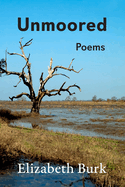
Elizabeth Burk's Unmoored traces the arc of an adventurous life defined by wanderlust and fresh beginnings. Burk's fourth poetry collection finds the native New Yorker nurturing new roots in Louisiana and calibrating the roles she inhabits as she transitions from city native and ex-wife to rural transplant, new bride, and grieving sister.
There is a sensory brilliance to Burk's recollections of childhood, such as the games played until sundown and a brush with Catholicism that alarmed her Jewish immigrant father. In "Catechism," she recounts a short-lived fascination with the ritual of confession, while her family's apathy toward religion laps at the edges of her words. "Gardening in the Dark" finds Burk (Learning to Love Louisiana) wondering where she and her sister, both "skeptical souls," will meet after death.
The comfort and consolation of precious sisterly memories in "Carapace" is preceded by "Sex After Seventy-Nine," in which memory loss is treated with disarming humor. "By the time/ we both arrive in the bedroom// let's hope we recall why/ we are there and what appendages// go where," Burk writes. Remembrances are bittersweet in "Phantom Child," as Burk pays tribute to the blissful union with a Spanish sculptor with whom she "conceived the child/ [she] later tore from [her] womb."
The sheer vastness of Burk's subjects, including hormone replacement therapy, "pre-coital// naps," and her decision to remarry, will delight readers. In a fitting coda to a peripatetic life, Burk trains her poetic gaze in the final poem on "those looming, late-blooming years" as they "creep and sprint" toward the finish line. --Shahina Piyarali

